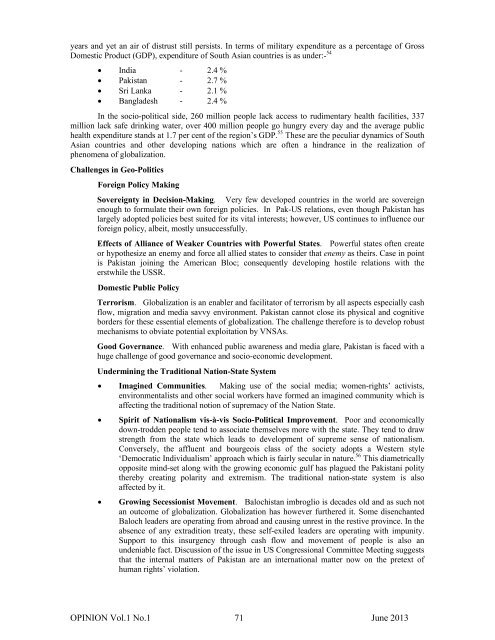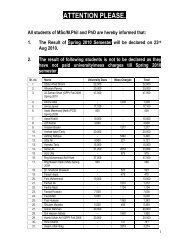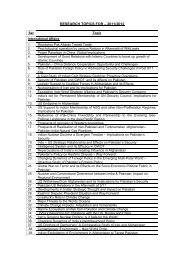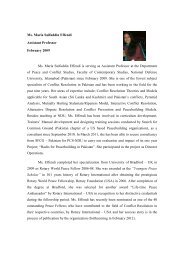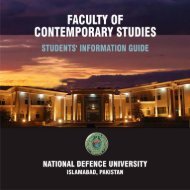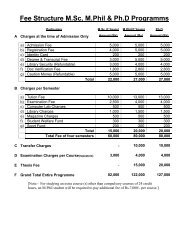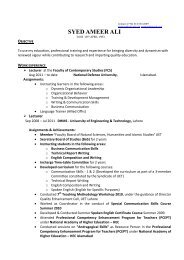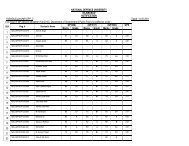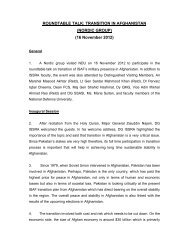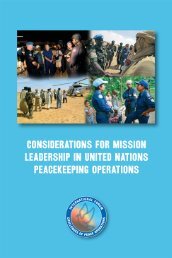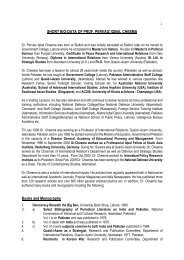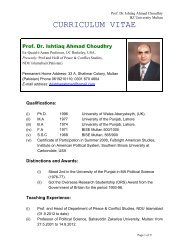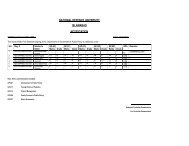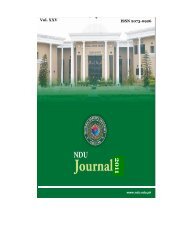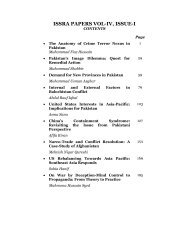OPINION Vol.1, No.1 June 2013 - National Defence University
OPINION Vol.1, No.1 June 2013 - National Defence University
OPINION Vol.1, No.1 June 2013 - National Defence University
Create successful ePaper yourself
Turn your PDF publications into a flip-book with our unique Google optimized e-Paper software.
years and yet an air of distrust still persists. In terms of military expenditure as a percentage of Gross<br />
Domestic Product (GDP), expenditure of South Asian countries is as under:- 54<br />
India - 2.4 %<br />
Pakistan - 2.7 %<br />
Sri Lanka - 2.1 %<br />
Bangladesh - 2.4 %<br />
In the socio-political side, 260 million people lack access to rudimentary health facilities, 337<br />
million lack safe drinking water, over 400 million people go hungry every day and the average public<br />
health expenditure stands at 1.7 per cent of the region’s GDP. 55 These are the peculiar dynamics of South<br />
Asian countries and other developing nations which are often a hindrance in the realization of<br />
phenomena of globalization.<br />
Challenges in Geo-Politics<br />
Foreign Policy Making<br />
Sovereignty in Decision-Making. Very few developed countries in the world are sovereign<br />
enough to formulate their own foreign policies. In Pak-US relations, even though Pakistan has<br />
largely adopted policies best suited for its vital interests; however, US continues to influence our<br />
foreign policy, albeit, mostly unsuccessfully.<br />
Effects of Alliance of Weaker Countries with Powerful States. Powerful states often create<br />
or hypothesize an enemy and force all allied states to consider that enemy as theirs. Case in point<br />
is Pakistan joining the American Bloc; consequently developing hostile relations with the<br />
erstwhile the USSR.<br />
Domestic Public Policy<br />
Terrorism. Globalization is an enabler and facilitator of terrorism by all aspects especially cash<br />
flow, migration and media savvy environment. Pakistan cannot close its physical and cognitive<br />
borders for these essential elements of globalization. The challenge therefore is to develop robust<br />
mechanisms to obviate potential exploitation by VNSAs.<br />
Good Governance. With enhanced public awareness and media glare, Pakistan is faced with a<br />
huge challenge of good governance and socio-economic development.<br />
Undermining the Traditional Nation-State System<br />
Imagined Communities. Making use of the social media; women-rights’ activists,<br />
environmentalists and other social workers have formed an imagined community which is<br />
affecting the traditional notion of supremacy of the Nation State.<br />
<br />
<br />
Spirit of <strong>National</strong>ism vis-à-vis Socio-Political Improvement. Poor and economically<br />
down-trodden people tend to associate themselves more with the state. They tend to draw<br />
strength from the state which leads to development of supreme sense of nationalism.<br />
Conversely, the affluent and bourgeois class of the society adopts a Western style<br />
‘Democratic Individualism’ approach which is fairly secular in nature. 56 This diametrically<br />
opposite mind-set along with the growing economic gulf has plagued the Pakistani polity<br />
thereby creating polarity and extremism. The traditional nation-state system is also<br />
affected by it.<br />
Growing Secessionist Movement. Balochistan imbroglio is decades old and as such not<br />
an outcome of globalization. Globalization has however furthered it. Some disenchanted<br />
Baloch leaders are operating from abroad and causing unrest in the restive province. In the<br />
absence of any extradition treaty, these self-exiled leaders are operating with impunity.<br />
Support to this insurgency through cash flow and movement of people is also an<br />
undeniable fact. Discussion of the issue in US Congressional Committee Meeting suggests<br />
that the internal matters of Pakistan are an international matter now on the pretext of<br />
human rights’ violation.<br />
<strong>OPINION</strong> <strong>Vol.1</strong> <strong>No.1</strong> 71 <strong>June</strong> <strong>2013</strong>


